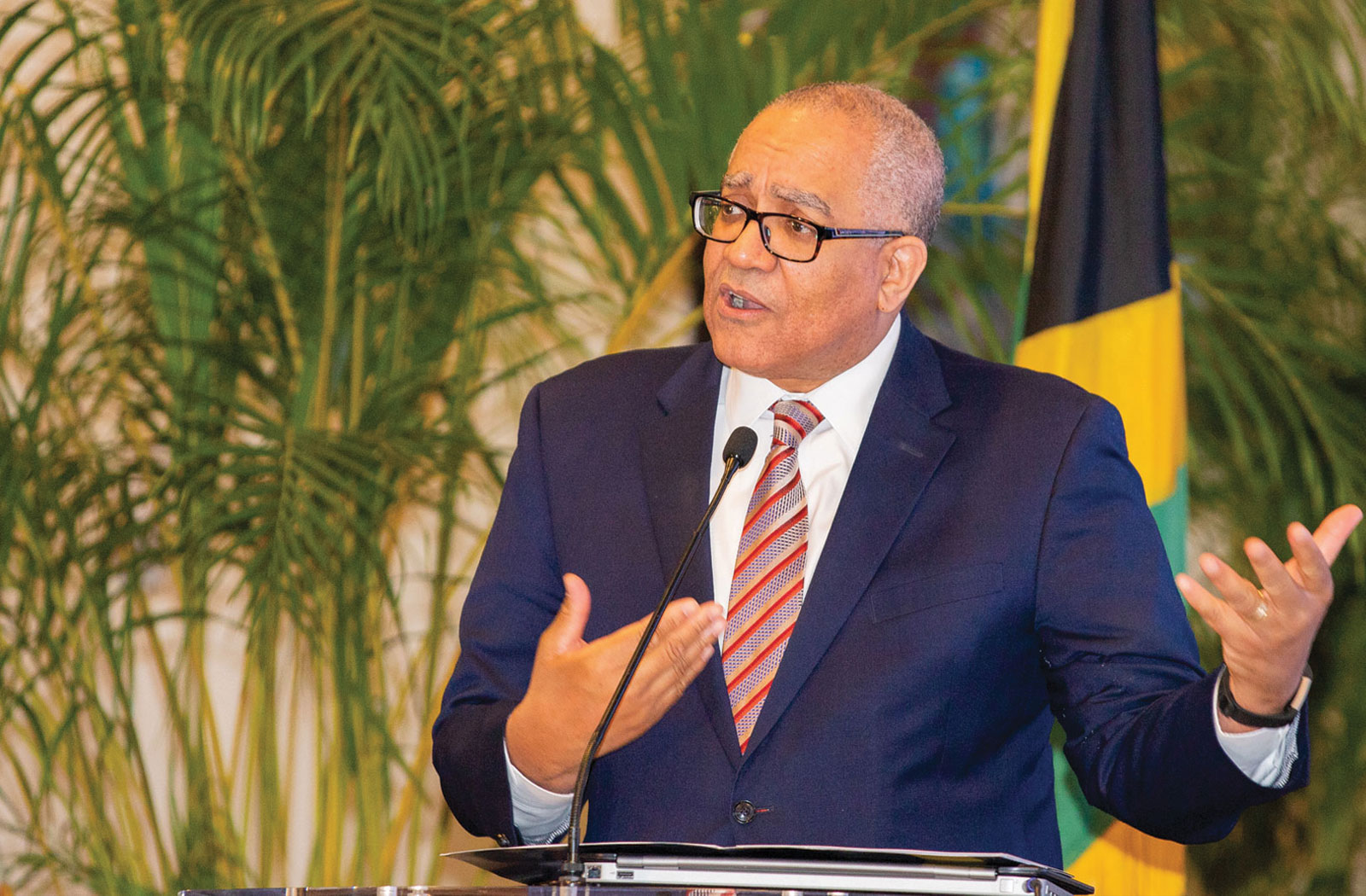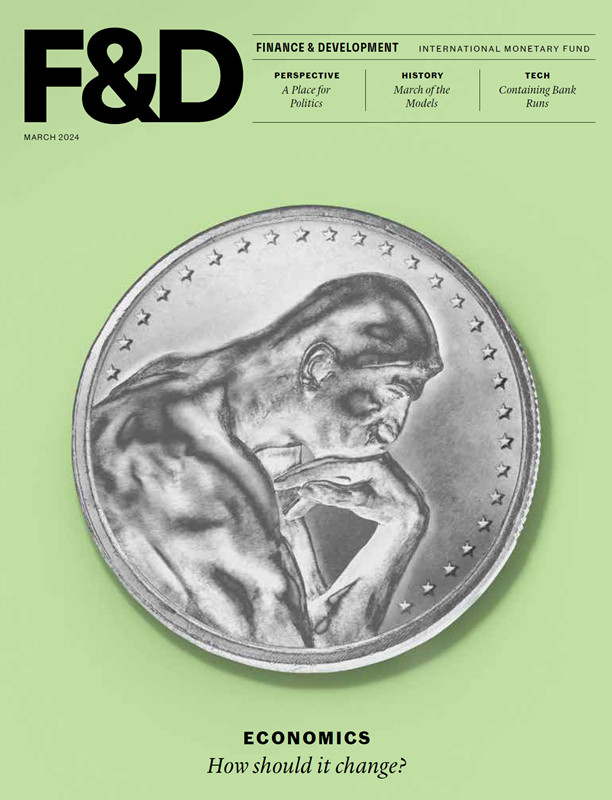Jamaica’s former central bank governor Brian Wynter explains the challenges of modernizing monetary policy
Jamaica has long struggled to gain control over its fiscal deficits and public debt and has often suffered damagingly high inflation. Recently, the country has scored important successes in stabilizing the economy—before it was hit hard by the COVID-19 crisis.
Brian Wynter was governor of the Bank of Jamaica during 2009–19 and was central to the country’s economic transformation. Under his leadership, monetary policy was strengthened, with the aim of price stability and a flexible exchange rate and significant accumulation of reserves. The Bank of Jamaica launched an innovative communications campaign, to a reggae beat, to explain the benefits of inflation targeting to a public long accustomed to focusing on the exchange rate, aiming to build public trust and understanding.
In this interview with F&D’s Olga Stankova, Wynter discusses Jamaica’s economic policy challenges.

BRIAN WYNTER, GOVERNOR OF THE BANK OF JAMAICA DURING 2009–19.
F&D: How did Jamaica, where the exchange rate played a large role for a long time, decide to embark on the reform of this regime?
BW: For many years we operated an exchange rate regime we considered to be flexible. But in retrospect, it was rather rigid. There can be a big difference between what people profess to be doing and what they are really doing. By the IMF’s assessment, we de facto had a crawl-like peg.
There were gaps elsewhere in the macroeconomic picture creating challenges for exchange rate policy. Fiscal expansion sometimes led to overvaluation through its impact on the balance of payments, and we needed to solve this problem.
Fiscal reform requires difficult steps for a country and its leaders. Fiscal rules were first established in 2010 and refined in 2014. Having a fiscal council, as is now proposed, can bring even more independent thinking and more trust in economic projections. The three IMF-supported programs I was involved in all aimed at addressing fiscal problems and unstable debt dynamics, helping bring inflation under control and avoid misalignments in the exchange rate.
An important complement to fiscal rules is the independence of the central bank in an inflation-targeting framework, with a more flexible exchange rate. If the Bank of Jamaica now receives a mandate for inflation and greater independence as proposed in new legislation, it will need to explain to the public why it is raising interest rates when, for example, the government says it should be cutting them. Already, the move towards inflation targeting has forced the central bank to communicate better.
The finish line on this path of reform is not yet in sight.

"LOW AND STABLE INFLATION IS TO THE ECONOMY WHAT THE BASS LINE IS TO REGGAE MUSIC."
F&D: Apart from inflation targeting, do you see other workable choices for countries that would like to move to greater exchange rate flexibility? Monetary targeting?
BW: It depends on country conditions. In Jamaica, we have tried every variety. In the 1990s, when we were targeting monetary aggregates, we discovered that for us it did not work. The variables did not perform, and the link between the variables and inflation broke down. And I think this has been shown in studies in other countries.
The exchange rate regime is a deep policy choice with significant consequences. But you need policy toolkits that can work with the choice you have made, and Jamaica is better placed to build a resilient and prosperous economy with a flexible exchange rate.
F&D: There has been discussion of integrating policy tools—interest rates, foreign exchange intervention, macroprudential measures, and capital controls—into an overall framework. What are the prerequisites for doing this successfully in small open economies?
BW: In Jamaica, which is a hyper-open developing economy, we will need many years to get each of these components working well enough, before the integration question is more than academic. That does not mean that we should not start thinking and looking at these things together. Fiscal and labor policies must be fit into this unified macro framework.
You can reach more sophisticated combinations eventually, but it is important not to get too caught up in this when there is a big fiscal deficit that needs to be fixed.
Persistence, focusing on and fixing one thing at a time, getting each one right—in the right sequence—is the main secret of success of many of the countries that have grown most strongly.
F&D: Speaking about one element of the framework, foreign exchange intervention, do you see a benefit to having some rules here?
BW: The central bank needs to have some simple and clear rules about foreign exchange intervention. It reassures people. Many stakeholders want this. But it is not black and white. In implementing rules, central banks must preserve a degree of discretion. They must also have overwhelming power to move the market. You put a couple of businesspeople together and they will try to find a way to make the most money, and you may end up privatizing gains and socializing losses. A central bank needs to safeguard the market against that sort of outcome. You need some rules, but you must preserve the ability to disrupt bad behavior.
F&D: How do you see the role of communication in building public support and understanding?
BW: The role of communication is enormous. When in 2018 we were going for greater independence, I felt the most important thing for the central bank would be its relationship with the public. It is all about the public in a democratic country.
We were paying a lot of attention to the machinery of monetary policy, the technical aspects, which is important. Yet you can get half of this wrong and still be right. But you cannot get communication wrong and still be right. I always thought that the machinery was maybe 30 or 40 percent of the central bank’s focus, and communication 10 percent. But I have since switched it around: communication is 30 or 40 percent.
In a way, that is what monetary policy has always been about. What will the stakeholders think? How are they going to react? Are they going to go out and shop more or not? Are they going to buy more foreign exchange or less?
F&D: The Bank of Jamaica used popular reggae music to explain the benefits of low and stable inflation to a public long accustomed to focusing on the exchange rate. Did this approach pay off?
BW: I do not think we have seen the payoff yet. This was a direct appeal to our population: the reggae music, TV and radio ads, and especially the billboards that are still out there saying that inflation is a monster—let’s not have it again.
But the central bank cannot beat that drum too long or too hard. It needs to connect to something, and I am not seeing right now how it connects. The ultimate payoff for effective communication is better understanding of policies, or attention to decisions.
One of the biggest remaining challenges is getting the public to understand that the central bank is not there to stop the exchange rate from moving. For a competitive and resilient economy, we need to overcome the force and power of the bias of the system towards a more rigid exchange rate. Having seen Jamaica successfully implement many difficult reforms, I am confident this change will come.
This interview has been edited for length and clarity.
Opinions expressed in articles and other materials are those of the authors; they do not necessarily reflect IMF policy.









